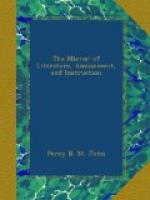M. L. B.
* * * * *
THE SELECTOR; AND LITERARY NOTICES OF NEW WORKS.
* * * * *
THE SORROWS OF ROSALIE,
A Tale.
This beautiful little volume has, in less than six months, reached a fourth edition, which is to us a proof that the readers of the present day know how to discriminate pure gold from pinchbeck or petit or, and intense, natural feeling from the tinsel and tissues of flimsy “poetry.” The booksellers, nevertheless, say that poetry is unsaleable, and they are usually allowed to speak feelingly on the score of popularity and success. Yet within a very short time, we have seen a splendid poem—the “Pelican Island,” by (the) Montgomery; the “Course of Time,” a Miltonic composition, by the Rev. Mr. Pollock; and now we have before us a poem, of which on an average, an edition has been sold in six weeks. The sweeping censure that poems are unsaleable belongs then to a certain grade of poetry which ought never to have strayed out of the album in which it was first written, except for the benefit of the stationer, printer, and the newspapers. Nearly all the poetry of this description is too bizarre, and wants the pathos and deep feeling which uniformly characterize true poetry, and have a lasting impression on the reader: whereas, all the “initial” celebrity, the honied sweetness, lasts but for a few months, and then drops into oblivion.




